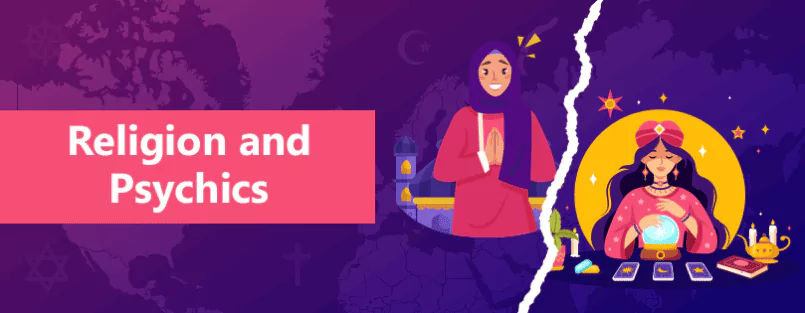
In a world where the mystical mingles with the mundane, it’s fascinating to discover how major religions perceive the realms beyond, including psychic practices. Let’s take a look at the perspectives of five of the most influential religions — Christianity, Islam, Hinduism, Buddhism, and Judaism — to uncover their interpretations of the metaphysical.
As we explore these diverse beliefs, it’s important to recognize the deeply personal nature of religious practice today. Although the foundational texts of these religions provide core guidelines, individual interpretations and practices can differ significantly. Many people have the profound personal freedom to express and explore their spirituality in unique ways.
By examining how major faiths view divination and psychic practices, we can gain a deeper understanding of spiritual life. Whether accepted, tolerated, or discouraged, these views reveal much about what each religion holds dear — enriching our view of the shared human experience.
The 5 Major World Religions
The big five world religions — Christianity, Islam, Hinduism, Buddhism, and Judaism — represent some of the oldest and most influential spiritual traditions around the world. These faiths have shaped spiritual beliefs and molded entire nations. Christianity for instance, has profoundly influenced the legal and cultural frameworks of Western Europe and the Americas, while Hinduism has been a cornerstone of Indian civilization.
Despite not necessarily having the largest number of followers compared to other religions, these five are considered major due to their historical depth, expansive cultural influence, and the extensive geographical areas they impact. They have been integral in the development of arts, sciences, and laws, and their teachings continue to serve as a moral compass for billions of people today.
Alongside these, newer religious movements like Sikhism, Baha’i, and various New Age spiritual practices attract millions of followers, too. Many of these faiths integrate traditional elements with contemporary issues, appealing to those who seek a different or more modern spiritual perspective. Faith is further diversified by a significant increase in people identifying with no religious affiliation at all.
The big five remain influential but they are part of a larger, more complex spiritual ecosystem. Let’s look at an overview of each to get a clearer picture of their population, spread, core beliefs, sacred texts, and cultural impact around the globe.
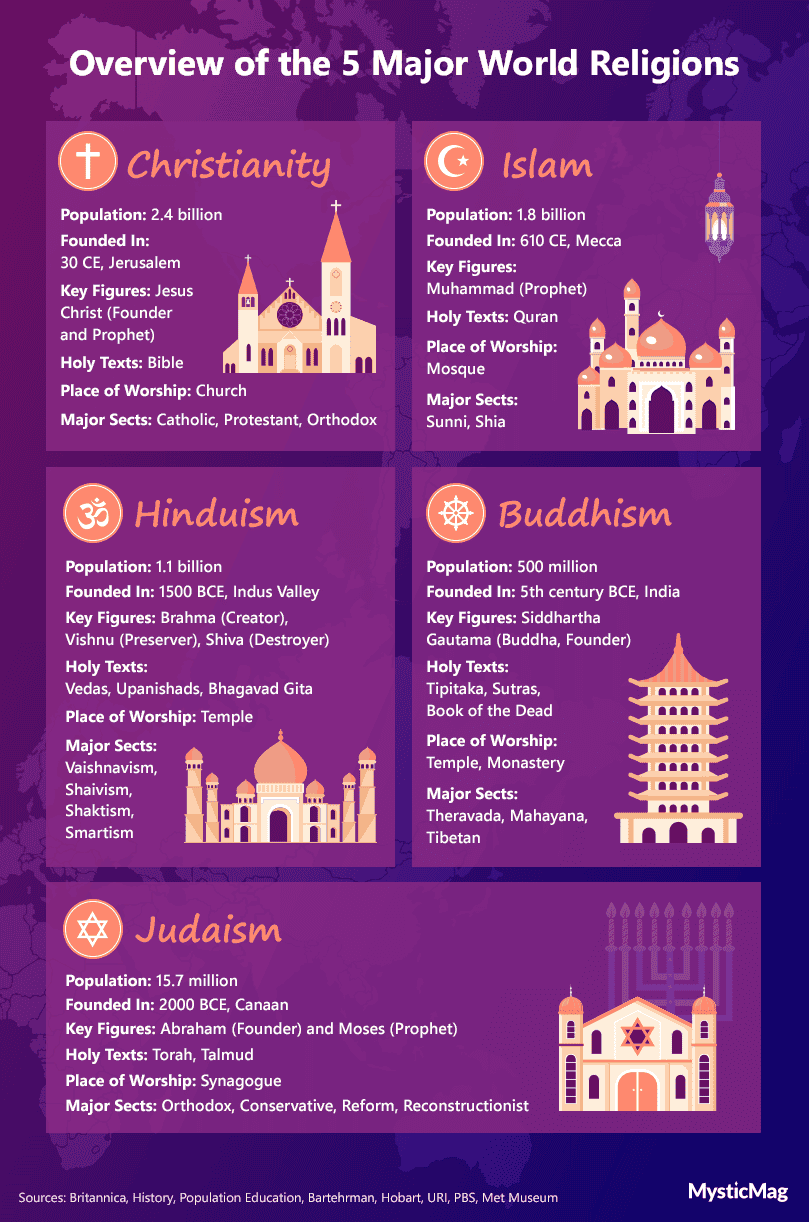
Christianity
Christianity has a complicated relationship with the supernatural. Looking at the biblical teachings against divination, the historical shifts in attitudes toward astrology, and the contemporary challenges within the Christian tradition, we unravel how these age-old doctrines continue to shape perspectives on the mystical. Is the allure of mystic practices compatible with the Christian faith, or does it challenge the very core of religious belief?
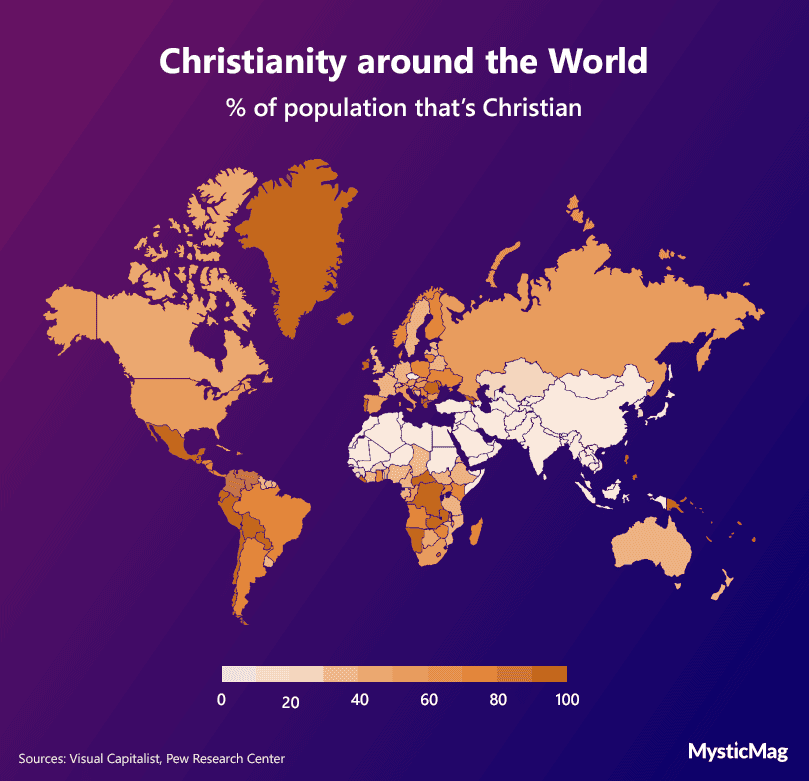
Biblical Foundations against Divination
Note: All biblical references are taken from the New International Version (NIV) of the Bible.
The Bible explicitly condemns divination, sorcery, and engaging with mediums as acts against God’s will. For instance, Acts 16:16-18 of the New Testament recounts an incident in which the Apostle Paul encounters a slave girl possessed by a spirit of divination. Paul commands the spirit to leave her in the name of Jesus Christ, highlighting the disapproval of such practices.
These verses not only forbid such actions but also suggest they receive the same grave consequences as sorcery, rebellion, and idolatry — all of which invite divine judgment. Galatians 5:19-21, for example, lists sorcery among the “acts of the flesh,” which are in opposition to living by the Spirit. The passage warns that those who practice such acts will not inherit the kingdom of God.
Additionally, Isaiah 47:13-14 critiques the trust placed on astrologers who failed to prevent the fall of Babylon, underlining just how ineffective and misguided reliance on such practices is suggested by the Bible to be.
Western Historical Perspectives on Astrology
The relationship between Christianity and astrology has had its ups and downs. Initially, astrology was mostly seen through a lens of suspicion, often lumped together with other occult practices frowned upon by the early Church.
Yet, during the Renaissance, there was a renewed fascination with astrology, fueled by a broader revival of interest in ancient philosophies and the arts. Astrology during this time began to be viewed as part of a larger intellectual endeavor to understand the cosmos and human destiny.
In both the US and Europe, the 19th century brought another wave of interest thanks to the spiritualism and New Age movements, which integrated astrological concepts more deeply into Western traditions. This pattern of skepticism and acceptance over the centuries shows just how complex the relationship between astrology and Christian doctrine is.
Controversy of Psychic Abilities
Within the Christian community, opinions about psychic abilities vary quite a bit. Some believers see skills like prophecy or spiritual discernment as divine gifts — true to the spirit of biblical teachings in which such insights were often God-sent to guide or reveal. However, there’s a clear line drawn at the church level between these perceived holy abilities and what’s traditionally seen as occult practices, like tarot reading or consulting mediums.
Leaders like Pope Francis have been outspoken against relying on fortune-telling, emphasizing that faith should lead believers back to God, not to the horoscope section. This is a common theme across many churches: While divine guidance is accepted, seeking insights from dubious sources is frowned upon.
Public Perception and Contemporary Beliefs
Church doctrine might be straightforward, but there is quite a bit of variation in the actual beliefs of individual Christians about psychic practices. Today’s cultural landscape, peppered with horoscopes and psychic hotlines presented as just-for-fun entertainment, sees many Christians dipping their toes without much thought of theological contradiction.
Yet this casual engagement doesn’t sit well with everyone. A considerable number of church leaders worry that even minimal engagement with psychic practices could mislead believers, drawing them away from true divine guidance.
Different denominations respond to this in varied ways. The Catholic Church, for instance, holds a rigid line against any form of divination, reflecting its deep-seated doctrines about the sovereignty of God’s will. On the other hand, there is a wider spectrum of views in Protestant churches, which tend to put a different emphasis on personal discernment and experiences than does the Catholic church.
Islam
What is Islam’s stance on the mystical and the unseen? Diving into the Islamic teachings on divination, the prophetic denunciations of fortune-telling, and the varying views on astrology across Islamic traditions, we uncover how deeply these practices impact modern Muslim beliefs.
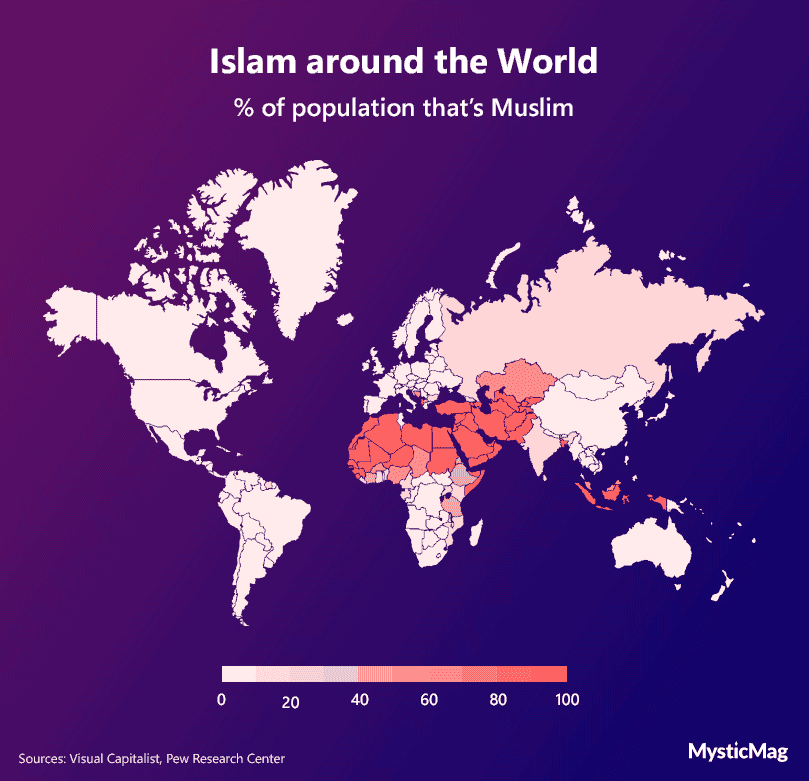
Islamic Teachings on Divination and Jinn
In Islam, jinn are significant entities, created from smokeless fire. They are endowed with free will, which allows them to influence the material world and play a significant role in testing human righteousness. This concept of moral testing is vividly illustrated in the story of Harut and Marut, two angels sent to Babylon, as recounted in Surah Al-Baqarah (2:102).
Harut and Marut were tasked with teaching some Babylonians about magic, but with a critical caveat — they warned their students that this knowledge was a trial to assess their faithfulness. The angels were clear that misusing these magical powers could lead individuals toward disbelief and moral decay.
This story underscores a key Islamic principle: While the supernatural can be part of the human experience, it must be approached with caution and a strong adherence to faith to avoid leading followers into disbelief.
Prophetic Guidance on Divination
Prophet Muhammad’s teachings explicitly denounce fortune-telling and psychic inquiries as forms of demonic influence. He provided clear guidance on the spiritual peril these practices pose to a believer’s faith. For example, a hadith reported by Abu Huraira in Sunan Abu Dawood states that anyone who believes what a soothsayer or fortune-teller says has effectively rejected what was revealed to Muhammad, equating such belief to apostasy.
Moreover, Muhammad sought to correct misunderstandings about natural events being ominous. He clarified that phenomena like solar eclipses are merely natural occurrences, not omens of good or ill fortune. By doing so, he aimed to steer the community away from superstition and toward a rational understanding of the universe as created and governed by Allah, devoid of the direct impact of human actions on cosmic events.
Views on Astrology across Islamic Traditions
Views on astrology vary significantly across different traditions in the Islamic world.
In Sunni Islam, astrology is considered haram (forbidden) as it conflicts with the principle of tawhid — the oneness of God — by attributing effects to celestial bodies rather than divine will. This is supported by teachings in the Quran, such as those found in Surah Al-Jinn (Quran 72:26-27), which denounce the claim that stars can determine destiny or the unseen.
Within Sufism, widely seen as a more mystical branch of Islam, some Sufi scholars have voiced support for astrology as a means to understanding the world. Ibn Arabi saw astrology as a way of gaining divine knowledge and working towards spiritual realization. Al-Ghazali believed that the universe is interconnected. He said that by studying the stars, one could learn about the workings of the cosmos.
Views on astrology among Sufi followers can vary. While some Sufi traditions incorporate astrological symbolism into their spiritual practices, many Sufis adhere to the mainstream Islamic prohibition against using astrology for divination.
In Shia Islam, celestial bodies are appreciated for their beauty and utility in navigation, and as shields against evil influences. Nonetheless, Shia scholars, like their Sunni counterparts, typically view astrology, especially for divination, as shirk (idolatry).
Overall, while there are pockets of tolerance within some Muslim groups toward astrology as a historical or scientific study, the prevailing view across Islam is that astrology, particularly as a means of fortune-telling, is strictly prohibited.
Strict Prohibitions and Spiritual Consequences
In Islam, fortune-telling and divination are serious no-gos. Classified as shirk, or associating others with Allah, these practices are among the gravest sins a believer can commit. The common Muslim expression “In sha Allah” (If Allah wills) captures this sentiment perfectly, reminding us that no matter our plans, Allah has the final say.
For those who stray into divination, the spiritual repercussions are steep. Engaging with fortune-tellers, for instance, can lead to a believer’s prayers being unanswered for forty days. Moreover, assigning supernatural attributes to objects like gemstones — believing they can influence one’s life independently of Allah — is considered outright disbelief, or kufr.
This prohibition is comprehensive, covering anything from horoscopes to psychic readings, emphasizing a core Islamic value: Trust and reliance should always be placed in Allah alone, not in stars, cards, or crystals.
The Concept of Kashf (Spiritual Unveiling)
The concept of kashf, or spiritual unveiling, holds a place of deep intrigue and debate. Primarily discussed within Sufi traditions, kashf is considered a form of spiritual insight that can be revealed to a believer through intense devotion and divine grace. This is not viewed as an ordinary occurrence but as a special manifestation of divine truth (tajalli) that happens only to those whose hearts are fully open to receiving such profound revelations.
Sufi teachings, such as those by the renowned mystic Ibn ‘Arabi, emphasize that these unveilings are gifts from Allah, meant to deepen one’s understanding of the divine mysteries. The primary focus should remain on achieving closeness to Allah and living a life in accordance with His will.
Public Perception and Contemporary Beliefs
Despite the clear prohibitions against divination in Islamic doctrine, the perception and practice among Muslims today vary significantly, influenced by cultural, regional, and generational factors. In some Muslim societies, certain forms of astrology, numerology, and visiting fortune-telling are culturally ingrained. These practices often survive as a form of tradition and are sometimes subtly woven into social and cultural rituals.
On the other hand, many devout Muslims adhere strictly to the Quran’s teachings, firmly rejecting any form of psychic or divinatory practices as they view these as serious transgressions against the principle of tawheed — the absolute oneness of Allah. For these believers, reliance on anything other than Allah for guidance is considered inappropriate and a direct violation of Islamic teachings.
Hinduism
Hinduism merges cosmic order with everyday life through its embrace of Vedic astrology for guiding significant life decisions and spiritual pathways. How do these ancient astrological practices and epic narratives shape modern Hindu society?
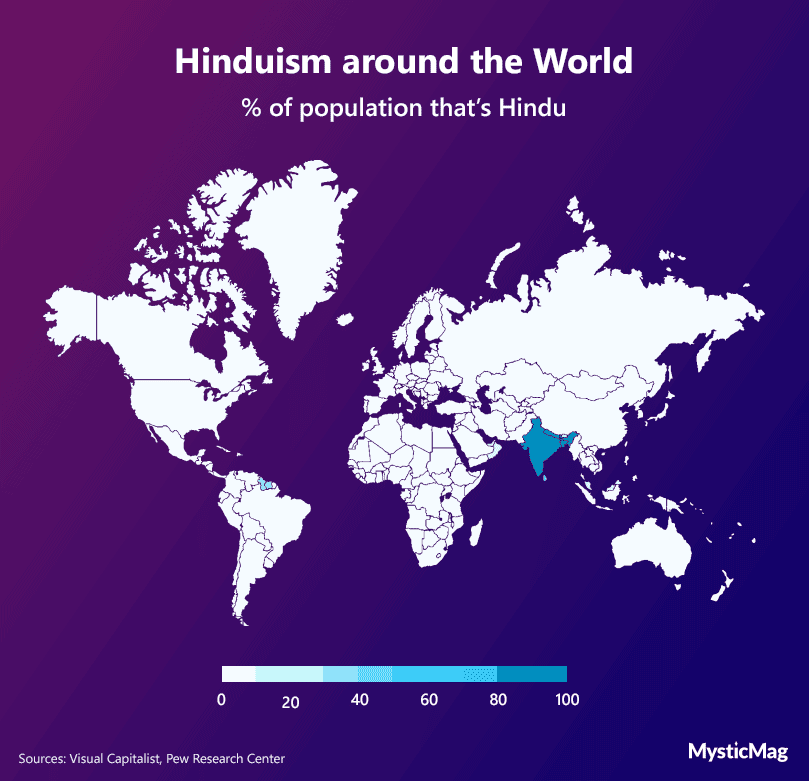
Vedic Astrology: The Eye of the Vedas
In Hindu culture, Vedic astrology, known as Jyotish, is highly esteemed as the “eye of the Vedas.” This ancient practice extends far beyond mere fortune-telling to serve as a spiritual guide, mapping an individual’s karma to help them navigate life’s essential pursuits.
These pursuits, known as the four Purusharthas, are artha (material prosperity), kama (pleasure and emotional fulfillment), dharma (ethical duty and righteousness), and moksha (spiritual liberation). Each serves as a cornerstone in an individual’s life, guiding their actions and decisions in alignment with cosmic forces, as interpreted through Vedic astrology.
Vedic astrology is intertwined with spiritual practices, providing insights that help followers align their daily lives with their cosmic duties. This ensures that adherents not only strive for personal and material well-being but also advance on their spiritual path toward ultimate liberation.
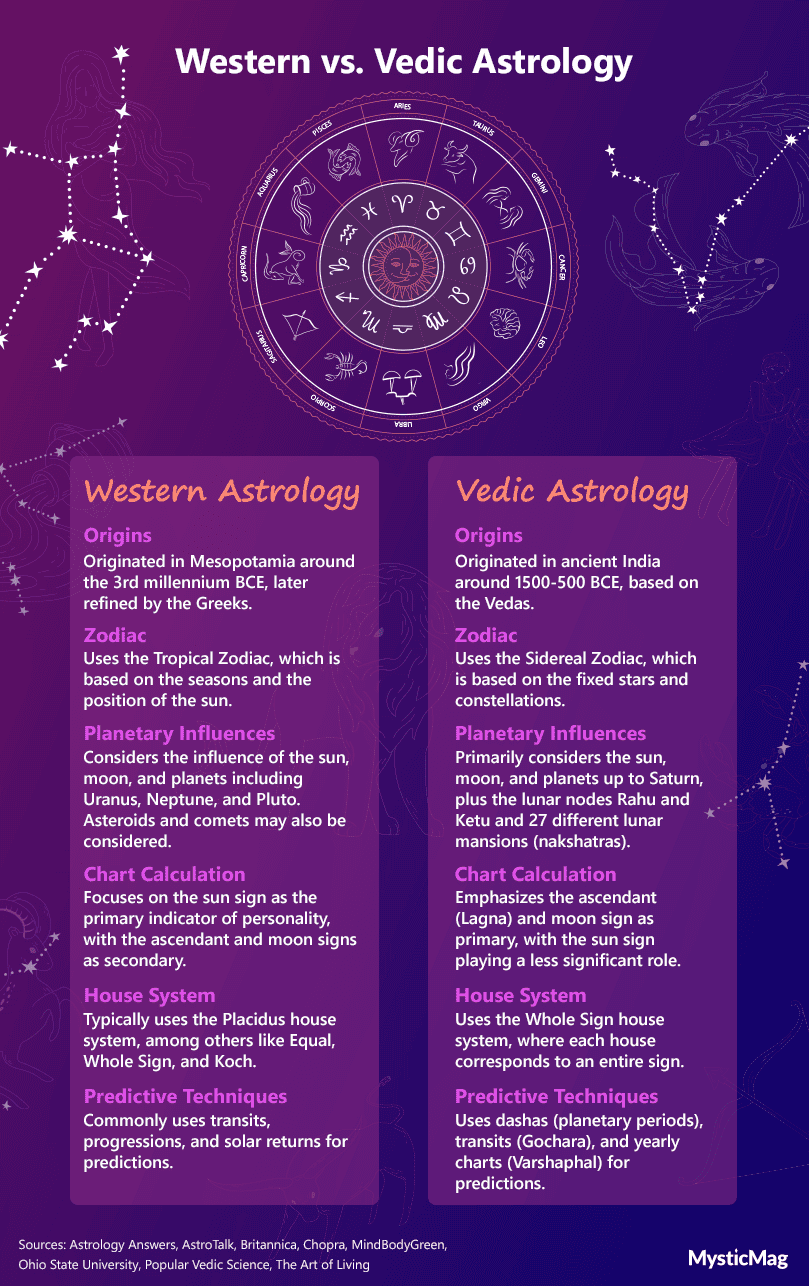
Astrology in Modern Indian Society
Astrology’s role to many contemporary Hindus cannot be overstated. It penetrates every aspect of personal and social life, influencing decisions from mundane daily choices to significant life-changing events.
In India, professional astrologers — Jyotishis — are regarded much like therapists or counselors in the West. They undergo extensive training in the art and science of astrology, which requires both a deep understanding of the stars and also a significant level of spiritual practice. This preparation equips them to cast detailed astrological charts that guide everything from choosing auspicious dates for weddings to naming newborns.
Astrology’s influence extends into spiritual practices as well. Rituals and pujas, which primarily serve to honor and worship in Hindu traditions, can play a crucial role in mitigating any negative astrological influences. These rituals are tailored to counteract the evil eye or any doshas (flaws) identified in the astrological charts, ensuring that individuals and families can maintain harmony and ward off potential misfortune.
Psychic Readings and Siddhis in Tradition
Psychic readings are often equated with accessing the Akashic records — believed to hold the complete knowledge of human experiences and universal history. Engaging with these records is considered akin to tapping into the universal subconscious, revealing possible life paths and future scenarios. These insights provide options rather than dictating fixed outcomes, respecting the Hindu belief in the power of individual free will to shape one’s destiny.
Siddhis, or spiritual powers, are extensively discussed in classical Yoga texts, such as the Yoga Sutras of Patanjali. These extraordinary abilities, which range from telepathy to more miraculous feats, are gained through intense meditation and rigorous spiritual disciplines.
While Siddhis are seen as natural extensions of human consciousness and valuable tools for spiritual advancement, they are also cautioned against. The texts warn that if these powers are sought for selfish reasons or if one becomes enamored with them, they can hinder true spiritual growth, turning into obstacles rather than aids.
Influence of Epics and Prophecies
The Hindu epics, notably the Ramayana and the Mahabharata, are filled with instances of divine visions and prophecies that guide the actions of their characters. For instance, in the Ramayana, King Dasharatha’s decision to perform a sacrificial ritual to obtain a son was heavily influenced by divine prophecies and celestial advice, leading to the birth of Rama and his brothers. Similarly, Sage Valmiki, the author of the Ramayana, was granted the ability to see the past, present, and future, enabling him to narrate the epic with divine insight.
These epics illustrate the profound role of divine vision (divya drishti) and prophecy in Hindu mythology, where supernatural insights often determine the course of human events. Such narratives not only enrich Hindu cultural heritage but also highlight the belief in a cosmos in which divine guidance is pivotal, seamlessly integrating the mystical with the everyday.
Public Perception and Contemporary Beliefs
In modern Hindu society, traditional practices like astrology and palmistry continue to play a significant role, particularly in India where they often influence decisions from marital matches to business openings. These practices are seen as cultural heritage as well as living traditions that evolve and adapt to modern needs, blending ancient wisdom with contemporary lifestyles.
Outside of India, the perception of Hindu spiritual and divinatory practices can be quite different. In Western countries, where significant Hindu communities have established themselves, these practices often take on new forms or merge with other spiritual traditions. For instance, yoga and meditation have been widely embraced within the broader scope of spiritual and wellness practices.
Buddhism
Buddhism addresses psychic and supernatural phenomena through Buddha’s pragmatic teachings, Tibetan divination practices like Mo, and the inclusion of astrology in cultural traditions. Let’s look at how these traditions align with, and sometimes challenge, the core Buddhist values of ethical living and personal endeavor.
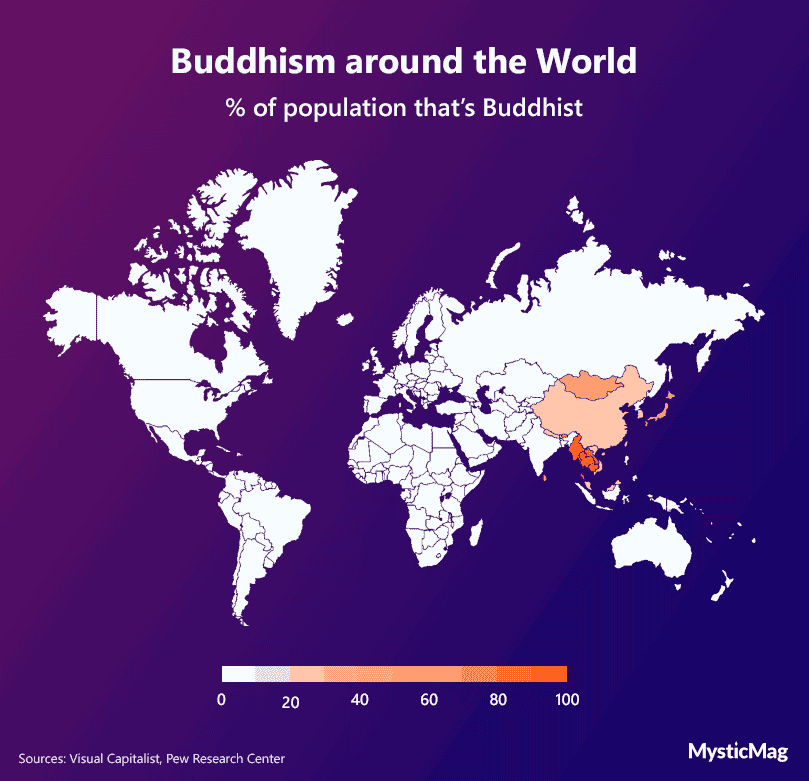
Buddha’s Teachings on Divination and Psychic Abilities
The Buddha offered a practical approach to divination and psychic phenomena, emphasizing that genuine success hinges on ethical living, intelligence, and personal effort — not on what might seem like favorable stars or mystic forecasts. He was keen on cutting through superstitions and advocated for a grounded, rational way to interpret the world around us.
At the same time, the Buddha didn’t deny the existence of psychic powers, or iddhis. These extraordinary abilities, from recalling past lives to manifesting physical phenomena, are seen as potential byproducts of deep meditation and intense spiritual discipline. They are meant to be tools for helping others and unveiling truths, the Buddha taught, and not to be used for personal gain.
Mo: Tibetan Divination
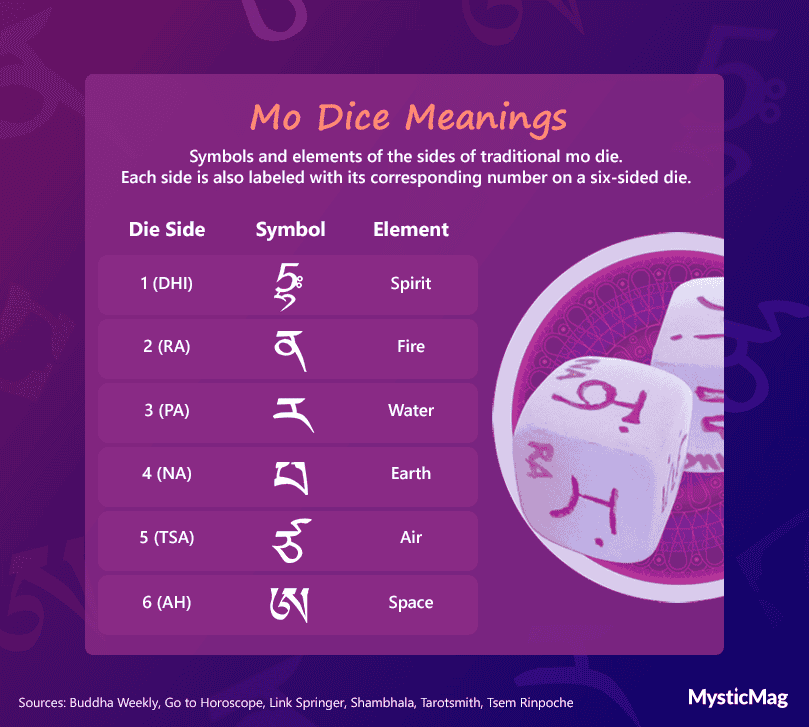
Mo, a traditional form of Tibetan divination, incorporates methods like dice casting and interpretations by learned lamas. This practice isn’t just about foreseeing the future; it’s a deeply reflective tool that aligns with the overarching principles of Tibetan Buddhism.
Used by practitioners for guidance on a wide range of issues — including health, work, travel, and other significant life decisions — Mo serves as a spiritual compass, helping individuals make choices that are in harmony with their spiritual paths and the teachings of Buddhism.
The reliance on lamas for interpreting Mo’s outcomes underscores the respect for spiritual authority within the community, ensuring that the insights gained are grounded in Buddhist philosophy and ethics. This divination practice does more than provide answers; it encourages a thoughtful reflection on one’s current life circumstances through the lens of Buddhist wisdom.
Tibetan-Mongolian Astrology
Tibetan-Mongolian astrology, blending elements from diverse cultures including Indian, Chinese, and native Bon traditions, serves as both a spiritual and practical tool within many Buddhist communities, particularly in Tibet.
This form of astrology goes beyond mapping personality through natal charts to predicting life paths with manually calculated charts. These predictions help reveal the karmic influences on a person’s life, offering foresight into the potential consequences of their actions. Astrologers also create almanacs that determine the most auspicious days for various activities, from planting crops to celebrating festivals — embedding astrology into community life.
However, in Buddhist thought, personal choice and destiny are not seen as mutually exclusive. The doctrine of dependent origination — which posits that all events and incidents are interconnected through a complex series of cause and effect — suggests that while astrology can offer insights, ultimate outcomes depend on individual actions and moral choices. So, while astrological insights are considered, they do not dictate one’s actions.
Divination as a Reflective Practice
Divination methods like Mo and Tarot in modern Buddhism have evolved from traditional fortune-telling tools into means for meditation and self-reflection. While not essential for all Buddhists in their quest for enlightenment, these practices help some practitioners on their path to deeper spiritual concepts such as karma and dependent arising.
Globally, perceptions of these practices vary: In the West, they are often seen as secular tools for psychological insight, whereas in places like Tibet and Thailand, they remain deeply embedded in daily religious life. These variations show that Buddhism can meet both traditional spiritual and modern personal development needs within different cultural settings.
Public Perception and Contemporary Beliefs in Buddhism
The public perception of divination within Buddhism varies widely across different regions and cultures. Initially, the Buddha set forth precepts that discouraged monks from engaging in divination, positioning Buddhism apart from other religious practices that included divinatory methods.
Over time, however, as Buddhism evolved and spread, these boundaries became less distinct. Mahayana Buddhism, for instance, incorporated concepts like “skillful means,” which allow for greater flexibility in practice, including the use of divination as a worldly tool.
In contemporary practice, divination is viewed with caution within many Buddhist communities. It is generally discouraged because it is difficult to establish the effectiveness of divination systems, the appropriateness of the advice given, and the qualifications of those performing the divination. This skepticism is rooted in the Buddha’s teachings, which emphasize self-reliance and personal effort as more important than external or mystical forces.
Despite these reservations, divination is sometimes practiced within certain Buddhist contexts. For instance, in some major temples, time-tested divination systems offer ‘quick’ assurances or ‘second opinions’ for devotees facing significant dilemmas.
In the West and certain Theravāda communities, divination might be seen more as a secular or personal development tool, loosely tied to Buddhist principles but not central to spiritual practice.
Judaism
Judaism’s complex relationship with astrology emerges from cautious scriptural references and medieval scholarly debates. We explore how historical interpretations and discussions on celestial influences continue to inform contemporary Jewish thought and practice. How do these traditions hold up against modern Jewish perspectives on astrology and the supernatural?
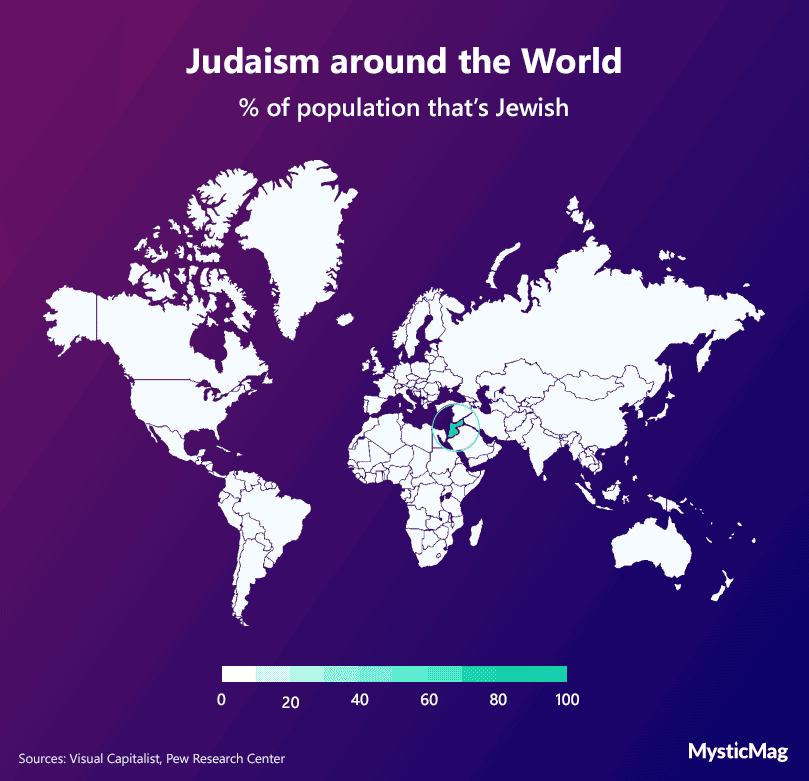
Astrology in Jewish Tradition
In Jewish tradition, the role of astrology is complex and nuanced. The Torah and Jewish Bible don’t outright endorse astrology; however, they do acknowledge celestial bodies as signs in Genesis 1:14, potentially hinting at their significance.
Yet, these same scriptures are clear about banning divination and soothsaying, with strong admonitions against these practices in Leviticus 19:31 and Deuteronomy 18:10-12, which align with broader prohibitions against any form of idolatry or worship of forces other than God.
Talmudic and Medieval References
Astrology is referenced in the Talmud, indicating some ancient rabbis believed celestial bodies could influence earthly events. This belief sparked debate over whether such influences apply to Jews, given their covenant with God.
Medieval thinkers also wrestled with these ideas. Maimonides, for instance, was quite critical of astrology, viewing it as a contradiction to the Jewish belief in human agency and divine guidance.
On the other hand, Abraham Ibn Ezra was more open to incorporating astrological concepts into his work, though he was careful not to suggest that these forces dictated human destiny. His writings tried to strike a balance, integrating astrological insights while upholding the fundamental tenets of the Jewish faith.
Kabbalah and Celestial Influence
In the mystical Jewish tradition of Kabbalah, celestial bodies are intertwined with divine emanations known as sefirot. Kabbalists believe that understanding these celestial influences can provide deeper insights into divine and human affairs. This perspective sees the movements of stars and planets as reflections of a higher spiritual reality, guiding individuals in their personal and communal lives.
However, Practical Kabbalah, which is an exercise that involves invoking these celestial forces to affect worldly events, is viewed with caution. Esteemed Kabbalistic figures like Rabbi Isaac Luria have insisted that only highly spiritual individuals should engage in these practices. He warned that those without sufficient spiritual purity and understanding risk adverse effects and spiritual contamination.
Tarot
The Tarot deck, while popularly linked with divination practices, also bears historical connections to Jewish mysticism, particularly Kabbalah. The symbolic images in Tarot cards are sometimes interpreted through the lens of Kabbalistic concepts, suggesting a deeper, spiritual significance beyond mere fortune-telling.
Despite this, the Torah’s stance against divination is clear, though it does not specifically mention Tarot. Using Tarot cards or any form of divination to attempt to control or predict future events is considered a violation of Jewish teachings, which emphasize the sovereignty of divine will and the importance of human free will.
Psychics and Occult Practices
In the early 20th century, particularly in bustling centers like New York, many Jews found themselves drawn to the allure of occult practices. Séances, psychic consultations, and horoscope analyses became popular and served as a bridge connecting traditional Jewish mysticism with the burgeoning modern lifestyle. These practices reflected the shifting cultural dynamics within Jewish communities, where traditional beliefs met new-world skepticism.
Psychics and clairvoyants often acted as informal advisors, offering guidance and support to community members who were navigating the complexities of life in a new world.
Public Perception and Contemporary Beliefs
The role of astrology in contemporary Jewish life varies between communities. While the phrase “mazel tov” is a popular expression of congratulations, its origins have largely faded from memory. The term “mazel,” meaning “constellation” or “star” in Hebrew, reflects the ancient belief that the stars at one’s birth could influence one’s fate, an idea once more widely accepted.
Astrology does not play a significant role in the major life decisions of most Jews. However, it continues to hold a niche interest, especially among those who engage with Kabbalistic mysticism. In these circles, astrology is often studied as part of a broader spiritual exploration, acknowledging its historical presence but not dictating daily decisions.
Certain Jewish denominations, including Conservative and Reform, officially oppose astrology. Orthodox opinions vary, with some rabbis outright rejecting astrology, while others acknowledge its historical relevance but limit its practical application.
The Bottom Line
Our exploration of how major religions perceive the mystical — astrology, psychic practices, and divination — reveals a diverse spectrum of beliefs. Each faith, influenced by its own doctrines and cultural narratives, approaches these practices differently.
Christianity, Islam, and Judaism typically prioritize divine will over celestial influences, often viewing divination as contrary to their core teachings. On the other hand, Hinduism embraces astrology as an integral part of spiritual life, using it to align daily living with cosmic rhythms. Buddhism adopts a measured stance, acknowledging the value of astrology and divination for spiritual exploration, yet emphasizing ethical application.
As our world becomes more interconnected, understanding and respecting these varied spiritual perspectives is crucial for fostering deeper intercultural dialogue and cooperation. By appreciating the different ways people relate to the unseen forces shaping our lives, we can promote a world richer in tolerance and mutual respect.
| Sharing is caring: MysticMag is the sole owner of the visual and written content in this article. We permit both our images and content to be shared on other websites, provided a credit with a link to the original article is included. By respecting our copyrights in this way, you help our team of experienced tarot readers, psychics, and astrologers continue their mission of helping our readers learn about the psychic services industry. |



